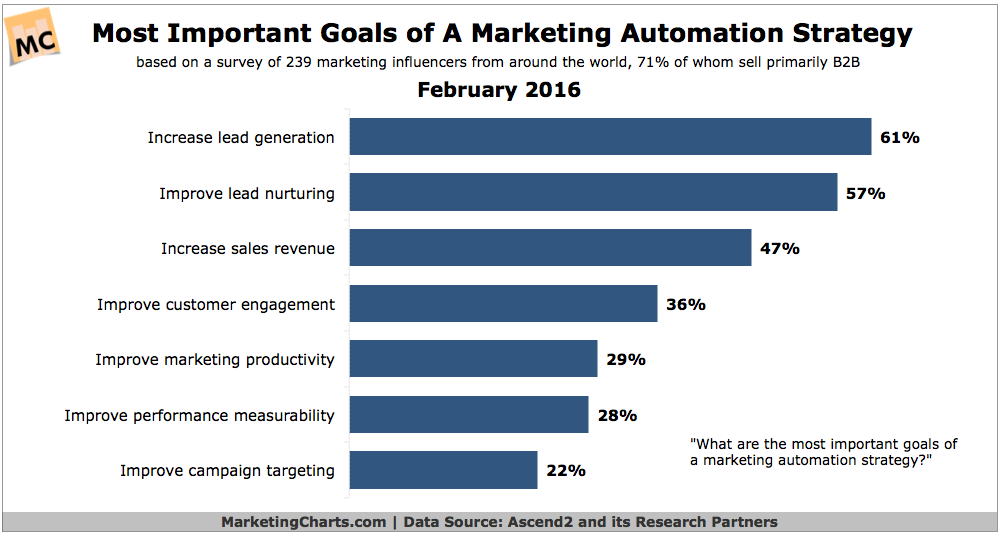
Only 30 percent of B2B marketers describe their organizations as effective at content marketing. That’s down from 38% in 2015, according to the Content Marketing Institute. The respondents in the 2016 study reporting greater effectiveness were those that had documentation, clarity around success, good communication and experience.
You know what can help with those attributes? Marketing automation.
Marketing automation is a software and process that helps prioritize and execute your marketing tasks more efficiently and with greater relevancy. A marketing program can help you track and nurture leads through the entire buyer’s journey, both identifying behaviors and segmenting users into relevant communication pathways.
You’ve likely heard tell of the wondrous promise of this tool that automates workflow, segments audiences, generates contact lists, provides keyword analysis and more. Yet, the remaining question is: Does Marketing Automation Work?
In a 2015 Marketo & Ascend2 study 91% of the most successful users agreed that marketing automation was “very important” to the overall success of their marketing across channels.
Some 87% of the top-performing firms in an 2014 Aberdeen Group study, too, were using marketing automation. Using the platforms effectively, exploiting the full functional capabilities to send email, generate website forms, segment databases, score and nurture leads, was more likely among the best-in-class firms.
Aberdeen’s Best-in-Class companies also saw higher average website conversion rates (6.7% versus 4.7%), higher conversion rates from raw lead to marketing-qualified lead (36% versus 18%) and a greater number of marketing-generated leads accepted by sales (53% versus 27%).

Modeling human behavior is challenging, but marketing automation can help by providing the data required to make analysis-driven choices. The deeper knowledge of leads and enhanced efficiencies of marketing automation can also reduce marketing-to-close cycle time.
In fact, one-third of the companies in Ascend2’s 2016 Marketing Automation Trends Survey rated marketing automation “very successful” at achieving important marketing goals such as lead generation and nurturing.
Lack of an effective strategy and complexity of the system were the two top barriers to marketing automation success. Marketing automation doesn't replace the need for human marketers. Instead, marketing automation helps identify relevant buyers, track better metrics, respond to users' needs more appropriately, and scale marketing efforts with greater success.
Perhaps this is why Ascend2 found 63% of companies outsourced all or part of their marketing automation strategy planning.
Sources:
Aberdeen Group (2014). State of Marketing Automation 2014: Processes that Produce. https://www.aberdeen.com/research/9575/RR-marketing-automation-platform.aspx/content.aspx
Ascend2 (2016, February). Marketing Automation Trends Survey Summary Report. https://ascend2.com/home/wp-content/uploads/Marketing-Automation-Trends-Survey-Summary-Report-160210.pdf
MarketingCharts.com: https://www.marketingcharts.com/online/most-important-goals-of-a-marketing-automation-strategy-65682/attachment/ascend2-most-important-goals-marketing-automation-strategy-feb2016/
by Jonathan Franchell, CEO of Ironpaper - For more tips and hacks: Need to remove a new line after h1 tags? Both web designers and SEO practitioners need to employ headline tags: H1, H2, H3 in several ways to improve web page structure and tag...

The Crowded Arena of the IT Marketplace Updated December 2024 The Information Technology (IT) landscape is experiencing rapid growth and intensifying competition. IT spending is projected to reach nearly 5.1 trillion U.S. dollars in 2024, a...

Updated December, 2024 The field of digital marketing is evolving rapidly in response to new technology and changing buyer expectations. To help career-minded marketers, we’ve rounded up the top 10 skills needed to succeed in the field. These are...
